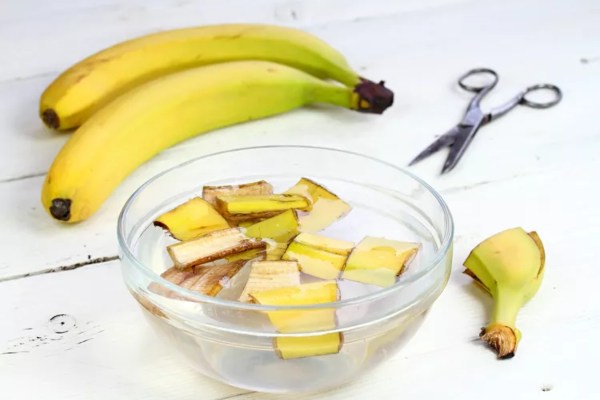If you love learning more about plants and searching for some gardening advice tips online, you may have seen someone steeping banana peels in water, soaking them overnight, and then pouring the water over their houseplants. This is a simple yet effective idea where you soak the banana peels to extract nutrients and then use the liquid as the fertilizer for your plants. This is getting quite popular on social media because banana peels contain nutrients like potassium and vitamin C which are great for plants. But is this idea truly effective?
On the other hand, eggshells are considered to be equally good for plants’ overall health as well. So, before you throw away the piles of eggshells after your yummy scrambled eggs for breakfast, think that the waste material could have so many benefits for the plants growing in your garden. These shells are rich in calcium content that gives nutrients to the plants and adds structure to the soil.
Let’s learn the uses and benefits of both banana water and eggshells for the betterment of your plant’s health:
What is banana water and How Does It Work?
Banana water is simply the water that you get after soaking banana peels in to create a liquid fertilizer for your plants. It is like compost tea but without the actual compost process. This simple fertilizer is obtained by soaking cut-up banana peels in water for overnight or a couple of days and then straining the liquid from the peels.
But what do experts have to say about this? Bananas are very high in potassium and humans benefit from eating them because we eat them directly and we absorb the elements that way. However, if plants are to benefit from organic materials, they need to be decomposed to some degree by another organism before it is soluble enough for their roots to absorb them. While banana water may do some good to plants, simply soaking banana peels in water won’t guarantee helping your plants as you might think.
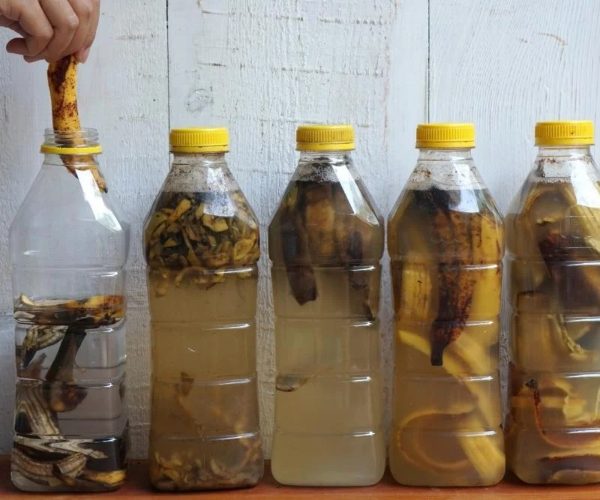
Luke Gatiboni, extension soil fertility specialist and associate professor at the North Carolina State University, says, ”If you mix banana peels with water and wait for a few [days], very few nutrients will be released because microorganisms’ decomposition takes time.”
He added, ”You would need to wait until that material is ‘rotten,’ so the nutrients will be released. The soil microorganisms are the key thing in this process. These microorganisms will decompose the organic carbon chains and release the nutrients.”
What Does Research Say About Banana Water?
There is not enough research when it comes to the benefits of banana water for your plants. Brooke Edmunds, professor of practice and horticulturist at Oregon State University Extension says, ‘‘The missing information is that I haven’t seen any studies that tell us what the components of banana water are.” He added, ”Does the potassium leach from the peels into the water? Does it matter how old the banana is (green, yellow with some spots, fully brown)? What else is leaching into the water? If anything leaches into the water, is it something that your plant needs? Is the plant potassium deficient, and does the banana water provide enough potassium? It’s a big unknown.”
What can we use instead of banana water?
There are a few things that you can do instead of banana water to improve your plant’s health.
Composting banana peels
Simply composting your banana peels will give more benefits to your plants than making banana water. Since bananas as very high in organic materials, it will be better if you let the microorganisms and detritus eaters like red wriggle composting worms do their job. “During composting, at least part of the organic compounds will be broken down by the microorganisms, releasing nutrients that will be readily available for plants,” says Gatiboni. If you add half-broken-down banana peels mixed with your soil, it will most probably be broken down later by the same microorganisms.
“In short, banana peels are a good source of nutrients for plants but the recommendation would be to compost it before applying it to the soil as a source of nutrients,” says Gatiboni.
Make Compost Tea
If you like using liquid fertilizer, you can try making compost tea. Here, you simply take finished compost soak it in water, and extract the compost’s microorganisms and nutrients.
Use Commercial Fertilizers
If you don’t like the above options, you can use standard or commercial fertilizers as well. There are lots of fertilizers, both solid and liquid plant food, that can help in the growth of your house plants.
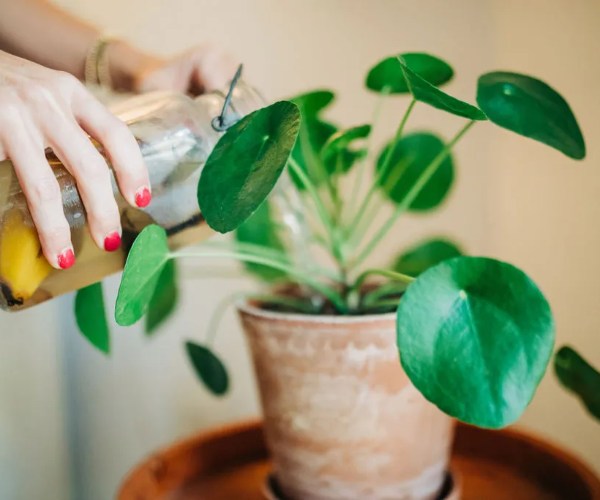
“I always recommend fertilizing plants based on need,” says Edmunds. She also recommends testing your soil to check what exactly is lacking in it. It is a bit tricky for indoor plants as it is costly to do so for each plant pot.
Benefits of Eggshells for Plants
Unlike banana water, eggshells have lots of benefits for your garden, including improving soil structure and nutrient content.
Increase calcium levels
Eggshells consist entirely of calcium carbonate just like seashells, chalk, and coral. While it may take some time for the calcium of the eggshells to work into the soil, it will increase the nutrient content. Plants can use the calcium for building cell walls.
Improves soil structure
Crushed eggshells can also improve the texture and structure of some soil quality. “In my experience, the number one use of eggshells in the garden is in compost,” says horticulturist Jennifer Petritz. “Eggshells do a great job of adding ‘grittiness’ to soil texture and help provide some aeration and lightness to compost.” The pulverized eggshells remain coarse and granular for some time.
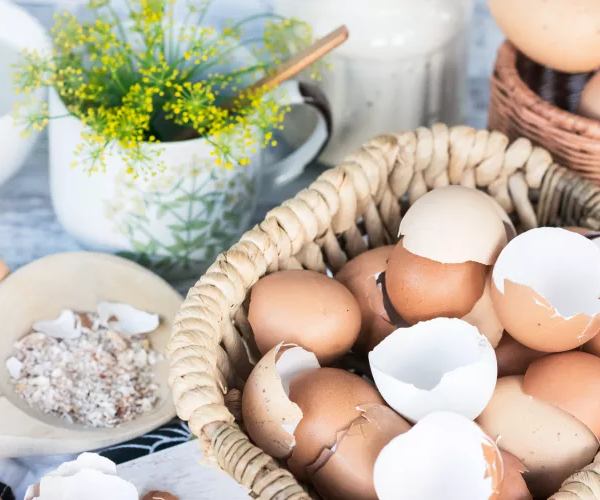
Also, Read Learn to Build a Water Garden Stocked Full of Fish and Plants!
Reduce Soil Acidity
Using eggshells in garden beds where the soil content is too acidic for your plants might be helpful. The calcium content in eggshells will reduce the acidity of the soil which is useful to plants that like soil with a more neutral pH.
Plants That Benefit from Eggshells
Many plants benefit from eggshells and they are tomatoes, potatoes, peas, broccoli, cauliflower, hostas, lungwort, daylilies, strawberries, basil, roses, ferns, etc.
How to Use Eggshells in Your Garden
These are a few ways you can use eggshells in your garden:
- Compost: Rinse, dry, and crush eggshells into fine pieces and add them to your compost pile. Just like other food scraps, they will decompose over time, says Shelley Cramm, founder of the blog Garden In Delight.
- Soil additive: If you don’t have a composter, work the eggshells directly into the soil to improve structure and boost calcium content. Rinse, dry, and crush eggshells finely, then add them to your soil.
- Mulch: Although tedious, eggshells can be used instead of mulch to suppress weeds. Rinse, dry, and crush the eggshells, then sprinkle them over the soil.
Tips for Using Eggshells in the Garden
Now that you have full knowledge of how to use egg shells for plants, here are some more tips that will give you success.
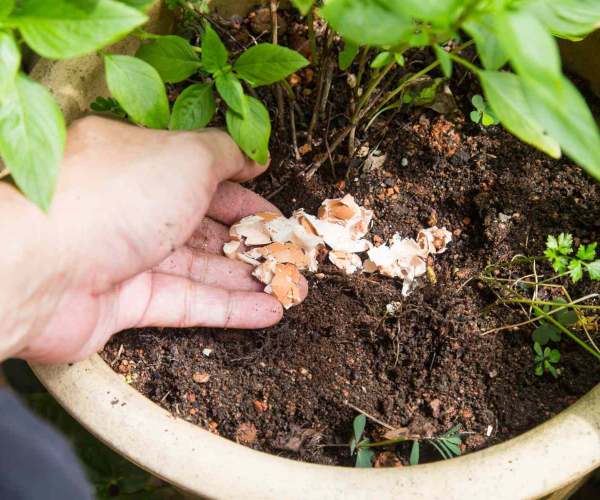
- Avoid mosquitoes: “A useful tip in adding eggshells to compost is to lightly crush them first,” says Petritz. “Shells that are left in halves will sometimes collect water and can be breeding areas for mosquitoes. Crushing them first eliminates this problem.”
- Test your soil: Test your soil before adding eggshells to your soil. This will give you a precise reading of the amount of calcium in the soil already.
- Finely crush the eggshells: Since eggshells can take a long time to break down crushing them helps facilitate the decomposition process when added to compost or soil.
FAQs
Q: How long does banana water last?
A: The best option for storing banana water concentrate is to keep it in the fridge in a clean, closed container. We recommend using the concentrate in two to four weeks. However, if you notice any weird smell, get rid of the ‘compost tea’ and make a new batch.
Q: Why do plants like banana water?
A: Banana water for plants is often praised for its potassium content, which is an essential nutrient for plant growth. Potassium plays a vital role in various physiological processes, including the development of strong roots, flower and fruit formation, and overall plant health.
Q: Are eggshells used for potted plants?
A: In a word, yes. Eggshells are a great addition to most gardens and houseplants since they contain calcium carbonate, which strengthens the structure of plants. All eggs—whether they’re speckled, brown, or white—are primarily made of this nutrient and contain potassium and phosphorous.
Q: What is the best homemade fertilizer?
A: “A compost pile would be the natural fertilizer I would strongly recommend,” says Kemper. To make compost, take all your scraps (like eggshells, fruit peels, and coffee grounds) and put them into a pile with leaves, sticks, and other organic debris.
Also, Read What is Variegated Plants? Here’s What You Need to Know!
